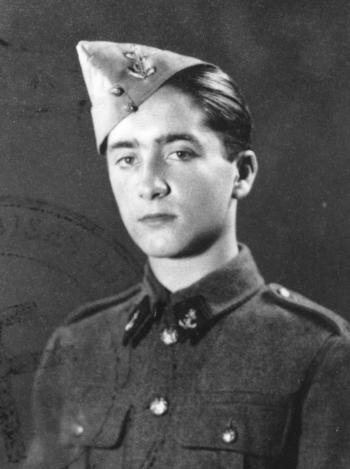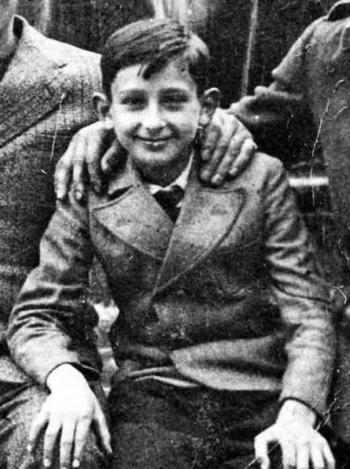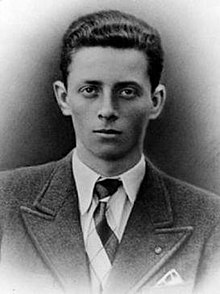Léon Bouvier

Léon Bouvier was born on September 28, 1923 in Vienna, Austria, to Polish parents.
At the age of 10, he asked his parents to send him to study in Paris. He entered the Lycée Michelet in Vanves as a resident of the French state.
In the summer of 1939, he learned of his mother's death and joined his father in Warsaw where he witnessed the German invasion and the bombing of the city.
He then left Warsaw and, after a long journey, took refuge in Lvov, in territory annexed by the Soviet army under the German-Soviet pact. Without means and not speaking Russian, he spends the harsh winter 39/40 by selling Soviet newspapers in the street.
In the spring of 1940, thanks to the intervention of the French Consulate in Moscow, he obtained papers allowing him to leave the Soviet zone.
He then leaves for Romania where he arrives to learn of the invasion of France and the signing of an armistice by the new government of Marshal Pétain.
He then decided not to return to France as the French consular authorities in Bucharest had suggested, but to join by his own means the fighting units of free France in the process of being set up in the Middle East.
After a long journey which leads him, with the help of the British diplomatic authorities, to Istanbul then to Haifa, he finally arrives at Ismailia, in Egypt, where he engages in free France, with the 1st Battalion of marine infantry (1st BIM).
He is then 16 years old and therefore hides his papers to pretend that he is 18.
He was sent to the front as a driver during the first British attack in Libya under the command of General Wavell. Back in Egypt, he was placed under the orders of Commander Pierre de Chevigné. The latter, guessing the age of Léon Bouvier, refused to take him to Eritrea and sent him, in the winter of 1940-1941, to the French lycée in Cairo to take the baccalaureate.
Young bachelor, Léon Bouvier joined the Free French Forces in the spring of 1941 and took part in the Syria campaign.
Assigned to the Pacific Battalion (BP 1) in September 1941, he was first secretary to the Divisional Staff but soon asked for a more active assignment and was then paid as a driver for the 101st Auto Company the following December.
Left for Libya with the 1st Brigade of General Koenig, the soldier 2nd class Bouvier is engaged in the night supply convoys in ammunition of the French forces besieged in Bir-Hakeim. On June 8, 1942 during a convoy, as he rushed to extinguish the fire in his truck caused by the bombing of a German plane, he was seriously injured and had his right arm amputated on the battlefield.
After a long repatriation journey via Cairo and Alexandria, he recuperated at the French military hospital in Beirut, where he was made a Companion of the Liberation by General de Gaulle.
He embarked in Damascus for England on Christmas Eve 1942 and was assigned as a corporal at the National War Commissariat; appointed adjutant on May 1, 1943, he entered the Cadet School of Free France on the same date, from which he graduated aspiring to the Corsican and Savoy promotion in December 1943.
In April 1944, Léon Bouvier was assigned to the Military Administrative Liaison Mission (MMLA) and then participated in the French campaign as an attaché to Colonel de Chevigné; he attended the liberation of Paris, Metz and Strasbourg before being seconded in February 1945 to the Ministry of Foreign Affairs.
Promoted lieutenant, he was demobilized in January 1946 and left to study in Montreal before returning to France where he successfully passed the entrance exam to the Ministry of Foreign Affairs.
He then began a long diplomatic career which led him to represent France in many countries. He notably exercised the functions of First Secretary of Embassy in Stockholm in 1962, of Economic Adviser in Berlin in 1965.
After being a student at the IHEDN and seconded to the office of the President of the National Assembly, he was sent in 1972 as consul general to Frankfurt am Main.
He was then appointed Ambassador to Paraguay in 1977, Ambassador to Chile in 1981 and then to Denmark in 1985.
He was raised to the dignity of Ambassador of France in 1987 before retiring the following year.
He was a member of the Council of the Order of the Legion of Honor since 1992 and a member of the Council of the Order of the Liberation since 1995.
Léon Bouvier died on July 23, 2005 in Paris. He is buried in the Montrouge cemetery


![16-07] La rafle du Vel d’Hiv : l’histoire de Lazare Pytkowicz](https://www.les-crises.fr/wp-content/uploads/2017/07/Lazare-Pytkowicz-3.jpg)

